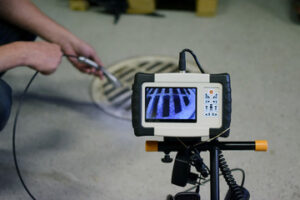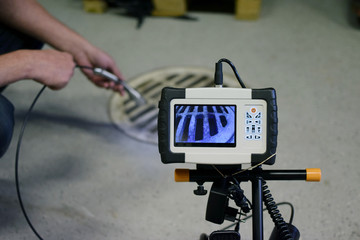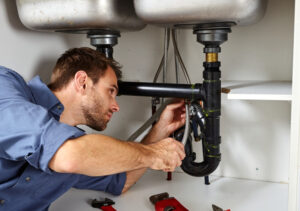Sewer lines are a vital part of your home, but they’re often out of sight and mind until something goes wrong. Knowing the condition of your sewer line can help you avoid costly repairs in the future.

In the past, determining a sewer problem required physically entering pipes with a flashlight and guessing where to dig. Now, a camera inspection allows inspectors to see what’s really going on inside the pipe without disturbing the ground.
Clogs are one of the main reasons people call a plumber. If your home’s sewer system isn’t properly working, it can lead to water or sewage backing up into drains. Clogged pipes can be caused by a variety of things, including tree roots, buildup, and more. It’s important to be able to find the source of the clog in order to get it fixed quickly and correctly. That’s where a sewer inspection comes in.
A plumber can use a drain auger or snake to clear most clogs, but if the clog is further down in the pipe, a camera may be needed. This allows the plumber to see what’s causing the blockage and what the best way to clear it is. This can save you money in the long run, as clogs that aren’t dealt with quickly can lead to more serious problems down the line.
In addition to clogs, the plumber can also look for other issues with the pipes, such as cracks, collapsed sections, and more. These problems can all cause serious damage to your home and can be expensive to fix. By keeping up with regular sewer line inspections, you can catch these problems before they become too severe.
The most common sign of a problem with your home’s sewer line is having multiple drains that aren’t working or are slow to drain. This can indicate that the underlying issue is with your main sewer line, which can be costly to repair. Getting a video sewer inspection can help you identify the issue and determine the best course of action.
Another indicator of a problem with your sewer line is if you notice an unpleasant odor coming from your drains. This could be a sign that there is a grease clog or even a full clog in the line. The odor can also be caused by broken or damaged pipes in your yard. It’s important to have these issues addressed as soon as possible to avoid extensive and expensive damage. A video sewer inspection can give you the information you need to act quickly.
Damage
Sewer lines are not something that most people think about very often, but they can cause a lot of damage if they are damaged or clogged. This can lead to expensive repairs and even structural damage to your home. Regular inspections can help prevent this type of damage and keep your sewer line working properly.
One of the most common problems that can affect a sewer line is damage from tree roots. These roots can cause cracks and breaks in the pipe, as well as blockages. The best way to prevent this is by having regular root removal services done. A good inspector will be able to spot the signs of root invasion and take the proper steps to remove them before they cause too much damage.
Another common problem that can occur in sewer lines is damage from aging and corrosion. This can be caused by a number of things, such as high water pressure, ground shifting, or just general wear and tear.
Damage to a sewer line can be very dangerous for homeowners, as it can lead to sewage back-ups and other issues that can cause significant health problems. If you notice that your sewer line is damaged or leaking, it is important to have it fixed right away.
If you are thinking of buying a new home, it is also important to have the sewer lines inspected before closing. This can help prevent costly repair bills and any unexpected surprises.
A good sewer inspector will be able to use a camera to view the entire interior of the pipe and identify any damage or clogs. Some inspectors will simply push the camera through the drain line, while others will need to access the sewer cleanout. A camera that has a self-leveling head is usually the most effective for viewing a sewer line.
A quality sewer inspection can be a great investment for both current and future homeowners. It can prevent costly repairs and help maintain a healthy and safe home environment. It can also help to determine responsibility for any repair costs, which can be helpful when negotiating with a seller.
Leaks
A leaking sewer pipe can be an extremely hazardous situation. If the leak is not fixed quickly, it can cause health issues for family members as well as structural damage to a home. A plumber can use a camera to see the condition of a sewer line and find out where a leak may be located. The plumber can then decide on the best plan for fixing the problem.
There are a few common signs that it is time for a sewer inspection. The most obvious is if water is taking longer than usual to drain down sinks, tubs, and showers. Another sign is if you notice gurgling sounds coming from your drains. A gurgling sound means that there is a blockage somewhere in your pipes and that the air is not able to circulate properly.
Other signs that you should get your sewer line inspected include if there are flies around your home. Flies are attracted to waste and can spread disease. A sewer leak can also cause your yard to become saturated with sewage, which can be a serious health hazard for your family and pets.
Leaks in your sewer line can be difficult to detect. Your plumber will need to look for access points into the sewer pipes that they can use to view the inside of the lines. These access points include maintenance holes, cleanouts, and other marked entry locations. The plumber can also use a high-powered flashlight to help them spot any problems.
Once the plumber has viewed the condition of your sewer pipes, they can provide you with a report and let you know what needs to be done to fix the problem. They can also give you an estimate for the cost of the repair work.
Many people have their sewer pipes inspected before selling their home. This ensures that the pipes are in good condition and can avoid costly repairs for the new homeowner. It is also a great way to reassure potential buyers that the home’s drain and sewer lines are in good working order.
Maintenance
Regular sewer inspections can help prevent clogs, repairs, and other costly issues. With frequent sewage inspections, professionals can easily locate and address any blockages or leaks that may be occurring in your sewer line. This helps to keep the system running smoothly and efficiently, protecting both your property and the environment.
In addition, a frequent sewer inspection can also help prevent damage to your home and belongings. When a sewer line leaks, it can cause flooding and water damage that can be very expensive to repair. It can also lead to the corrosion of pipes, which could result in a broken, disconnected pipe or even a collapsed sewer line.
A professional can use a camera to determine the location and severity of the issue, allowing them to make quick and accurate repairs. Additionally, regular inspections can help identify potential problems, such as a root invasion or a cracked pipe, before they cause an emergency situation.
There are a few different types of sewer inspection cameras that professionals can choose from. Push cameras, self-leveling cameras, and pan-and-tilt cameras are all used to inspect sewer lines. These cameras can be pushed through a drain or other access point and transmit real-time footage to a monitor or other device. They can also be used to capture video of the interior of a sewer pipe when other methods aren’t available or effective.
While a traditional sewer inspection usually involves inspectors entering the pipes manually with a flashlight, new technology has made this process much safer and faster. Robotic cameras can navigate the entire length of a pipe without the need for physical entry, reducing both risk and cost. Additionally, these cameras can help pinpoint the location of the problem, which can speed up the repair process and lower maintenance costs.
While a sewer inspection can be a scary prospect, it’s essential to the health of your home and the safety of your family. Whether you’re looking to buy or sell a property, a sewer inspection can help you make the best decision for your needs. A simple inspection can help you save thousands of dollars in potential damages and repairs.


